- Home
- Robert E. Howard
Conan the Cimmerian: The Complete Tales (Trilogus Classics)
Conan the Cimmerian: The Complete Tales (Trilogus Classics) Read online
Table of Contents
Excerpt
Title Page
Publication Page
The Hyborean Age
The Phoenix on the Sword
The Scarlet Citadel
The Tower of the Elephant
Black Colossus
The Slithering Shadow
The Pool of the Black One
Rogues in the House
Shadows in the Moonlight
Queen of the Black Coast
The Devil in Iron
The People of the Black Circle
A Witch Shall Be Born
The Jewels of Gwahlur
Beyond the Black River
Shadows in Zamboula
The Hour of the Dragon - Part 1
The Hour of the Dragon - Part 2
Red Nails
Cimmeria (A Poem)
About the Author
Trilogus Classics
"Know, oh prince, that between the years when the oceans drank Atlantis and the gleaming cities, and the years of the rise of the Sons of Aryas, there was an Age undreamed of, when shining kingdoms lay spread across the world like blue mantles beneath the stars–Nemedia, Ophir, Brythunia, Hyperborea, Zamora with its dark-haired women and towers of spider-haunted mystery, Zingara with its chivalry, Koth that bordered on the pastoral lands of Shem, Stygia with its shadow-guarded tombs, Hyrkania whose riders wore steel and silk and gold. But the proudest kingdom of the world was Aquilonia, reigning supreme in the dreaming west. Hither came Conan, the Cimmerian, black-haired, sullen-eyed, sword in hand, a thief, a reaver, a slayer, with gigantic melancholies and gigantic mirth, to tread the jeweled thrones of the Earth under his sandalled feet."
CONAN THE CIMMERIAN
The Complete Tales
of
Robert E. Howard
TRILOGUS BOOKS
www.trilogus.com
Conan the Commerian: The Complete Tales
Written by Robert E. Howard
Published by Trilogus Media Group
All rights reserved. Without limiting the rights under copyright reserved above, no part of this publication may be reproduced, stored in or introduced into a retrieval system, or transmitted, in any form, or by any means (electronic, mechanical, photocopying, recording, or otherwise) without the prior written permission of both the copyright owner and the above publisher of this book.
This is a work of fiction. Names, characters, places, brands, media, and incidents are either the product of the author's imagination or are used fictitiously. The author acknowledges the trademarked status and trademark owners of various products referenced in this work of fiction, which have been used without permission. The publication/use of these trademarks is not authorized, associated with, or sponsored by the trademark owners.
eBook Edition License Notes
This ebook is licensed for your personal enjoyment only. This ebook may not be re-sold or given away to other people. If you would like to share this book with another person, please purchase an additional copy for each person you share it with. If you're reading this book and did not purchase it, or it was not purchased for your use only, then you should return to Smashwords.com and purchase your own copy. Thank you for respecting the author's work.
The Hyborian Age
(Nothing in this article is to be considered as an attempt to advance any theory in opposition to accepted history. It is simply a fictional background for a series of fiction-stories. When I began writing the Conan stories a few years ago, I prepared this 'history' of his age and the peoples of that age, in order to lend him and his sagas a greater aspect of realness. And I found that by adhering to the 'facts' and spirit of that history, in writing the stories, it was easier to visualize (and therefore to present) him as a real flesh-and-blood character rather than a ready-made product. In writing about him and his adventures in the various kingdoms of his Age, I have never violated the 'facts' or spirit of the 'history' here set down, but have followed the lines of that history as closely as the writer of actual historical-fiction follows the lines of actual history. I have used this 'history' as a guide in all the stories in this series that I have written.)
Of that epoch known by the Nemedian chroniclers as the Pre-Cataclysmic Age, little is known except the latter part, and that is veiled in the mists of legendry. Known history begins with the waning of the Pre-Cataclysmic civilization, dominated by the kingdoms of Kamelia, Valusia, Verulia, Grondar, Thule and Commoria. These peoples spoke a similar language, arguing a common origin. There were other kingdoms, equally civilized, but inhabited by different, and apparently older races.
The barbarians of that age were the Picts, who lived on islands far out on the western ocean; the Atlanteans, who dwelt on a small continent between the Pictish Islands and the main, or Thurian Continent; and the Lemurians, who inhabited a chain of large islands in the eastern hemisphere.
There were vast regions of unexplored land. The civilized kingdoms, though enormous in extent, occupied a comparatively small portion of the whole planet. Valusia was the western-most kingdom of the Thurian Continent; Grondar the eastern-most. East of Grondar, whose people were less highly cultured than those of their kindred kingdoms, stretched a wild and barren expanse of deserts. Among the less arid stretches of desert, in the jungles, and among the mountains, lived scattered clans and tribes of primitive savages. Far to the south there was a mysterious civilization, unconnected with the Thurian culture, and apparently pre-human in its nature. On the far-eastern shores of the Continent there lived another race, human, but mysterious and non-Thurian, with which the Lemurians from time to time came in contact. They apparently came from a shadowy and nameless continent lying somewhere east of the Lemurian Islands.
The Thurian civilization was crumbling; their armies were composed largely of barbarian mercenaries. Picts, Atlanteans and Lemurians were their generals, their statesmen, often their kings. Of the bickerings of the kingdoms, and the wars between Valusia and Commoria, as well as the conquests by which the Atlanteans founded a kingdom on the mainland, there were more legends than accurate history.
Then the Cataclysm rocked the world. Atlantis and Lemuria sank, and the Pictish Islands were heaved up to form the mountain peaks of a new continent. Sections of the Thurian Continent vanished under the waves, or sinking, formed great inland lakes and seas. Volcanoes broke forth and terrific earthquakes shook down the shining cities of the empires. Whole nations were blotted out.
The barbarians fared a little better than the civilized races. The inhabitants of the Pictish Islands were destroyed, but a great colony of them, settled among the mountains of Valusia's southern frontier, to serve as a buffer against foreign invasion, was untouched. The Continental kingdom of the Atlanteans likewise escaped the common ruin, and to it came thousands of their tribesmen in ships from the sinking land. Many Lemurians escaped to the eastern coast of the Thurian Continent, which was comparatively untouched. There they were enslaved by the ancient race which already dwelt there, and their history, for thousands of years, is a history of brutal servitude.
In the western part of the Continent, changing conditions created strange forms of plant and animal life. Thick jungles covered the plains, great rivers cut their roads to the sea, wild mountains were heaved up, and lakes covered the ruins of old cities in fertile valleys. To the Continental kingdom of the Atlanteans, from sunken areas, swarmed myriads of beasts and savages–ape-men and apes. Forced to battle continually for their lives, they yet managed to retain vestiges of their former state of highly advanced barbarism. Robbed of metals and ores, they became workers
in stone like their distant ancestors, and had attained a real artistic level, when their struggling culture came into contact with the powerful Pictish nation. The Picts had also reverted to flint, but had advanced more rapidly in the matter of population and war-science. They had none of the Atlanteans' artistic nature; they were a ruder, more practical, more prolific race. They left no pictures painted or carved on ivory, as did their enemies, but they left remarkably efficient flint weapons in plenty.
These stone-age kingdoms clashed, and in a series of bloody wars, the outnumbered Atlanteans were hurled back into a state of savagery, and the evolution of the Picts was halted. Five hundred years after the Cataclysm the barbaric kingdoms have vanished. It is now a nation of savages–the Picts–carrying on continual warfare with tribes of savages–the Atlanteans. The Picts had the advantage of numbers and unity, whereas the Atlanteans had fallen into loosely knit clans. That was the west of that day.
In the distant east, cut off from the rest of the world by the heaving up of gigantic mountains and the forming of a chain of vast lakes, the Lemurians are toiling as slaves of their ancient masters. The far south is still veiled in mystery. Untouched by the Cataclysm, its destiny is still pre-human. Of the civilized races of the Thurian Continent, a remnant of one of the non-Valusian nations dwells among the low mountains of the southeast–the Zhemri. Here and there about the world are scattered clans of apish savages, entirely ignorant of the rise and fall of the great civilizations. But in the far north another people are slowly coming into existence.
At the time of the Cataclysm, a band of savages, whose development was not much above that of the Neanderthal, fled to the north to escape destruction. They found the snow-countries inhabited only by a species of ferocious snow-apes–huge shaggy white animals, apparently native to that climate. These they fought and drove beyond the Arctic Circle, to perish, as the savages thought. The latter, then, adapted themselves to their hardy new environment and throve.
After the Pictish-Atlantean wars had destroyed the beginnings of what might have been a new culture, another, lesser cataclysm further altered the appearance of the original continent, left a great inland sea where the chain of lakes had been, to further separate west from east, and the attendant earthquakes, floods and volcanoes completed the ruin of the barbarians which their tribal wars had begun.
A thousand years after the lesser cataclysm, the western world is seen to be a wild country of jungles and lakes and torrential rivers. Among the forest-covered hills of the northwest exist wandering bands of ape-men, without human speech, or the knowledge of fire or the use of implements. They are the descendants of the Atlanteans, sunk back into the squalling chaos of jungle-bestiality from which ages ago their ancestors so laboriously crawled. To the southwest dwell scattered clans of degraded, cave-dwelling savages, whose speech is of the most primitive form, yet who still retain the name of Picts, which has come to mean merely a term designating men–themselves, to distinguish them from the true beasts with which they contend for life and food. It is their only link with their former stage. Neither the squalid Picts nor the apish Atlanteans have any contact with other tribes or peoples.
Far to the east, the Lemurians, leveled almost to a bestial plane themselves by the brutishness of their slavery, have risen and destroyed their masters. They are savages stalking among the ruins of a strange civilization. The survivors of that civilization, who have escaped the fury of their slaves, have come westward. They fall upon that mysterious pre-human kingdom of the south and overthrow it, substituting their own culture, modified by contact with the older one. The newer kingdom is called Stygia, and remnants of the older nation seemed to have survived, and even been worshipped, after the race as a whole had been destroyed.
Here and there in the world small groups of savages are showing signs of an upward trend; these are scattered and unclassified. But in the north, the tribes are growing. These people are called Hyborians, or Hybori; their god was Bori–some great chief, whom legend made even more ancient as the king who led them into the north, in the days of the great Cataclysm, which the tribes remember only in distorted folklore.
They have spread over the north, and are pushing southward in leisurely treks. So far they have not come in contact with any other races; their wars have been with one another. Fifteen hundred years in the north country have made them a tall, tawny-haired, grey-eyed race, vigorous and warlike, and already exhibiting a well-defined artistry and poetism of nature. They still live mostly by the hunt, but the southern tribes have been raising cattle for some centuries. There is one exception in their so far complete isolation from other races: a wanderer into the far north returned with the news that the supposedly deserted ice wastes were inhabited by an extensive tribe of ape-like men, descended, he swore, from the beasts driven out of the more habitable land by the ancestors of the Hyborians. He urged that a large war-party be sent beyond the arctic circle to exterminate these beasts, whom he swore were evolving into true men. He was jeered at; a small band of adventurous young warriors followed him into the north, but none returned.
But tribes of the Hyborians were drifting south, and as the population increased this movement became extensive. The allowing age was an epoch of wandering and conquest. Across the history of the world tribes and drifts of tribes move and shift in an ever-changing panorama.
Look at the world five hundred years later. Tribes of tawny-haired Hyborians have moved southward and westward, conquering and destroying many of the small unclassified clans.
Absorbing the blood of conquered races, already the descendants of the older drifts have begun to show modified racial traits, and these mixed races are attacked fiercely by new, purer-blooded drifts, and swept before them, as a broom sweeps debris impartially, to become even more mixed and mingled in the tangled debris of races and tag ends of races.
As yet the conquerors have not come in contact with the older races. To the southeast the descendants of the Zhemri, given impetus by new blood resulting from admixture with some unclassified tribe, are beginning to seek to revive some faint shadow of their ancient culture. To the west the apish Atlanteans are beginning the long climb upward. They have completed the cycle of existence; they have long forgotten their former existence as men; unaware of any other former state, they are starting the climb unhelped and unhindered by human memories. To the south of them the Picts remain savages, apparently defying the laws of Nature by neither progressing nor retrogressing. Far to the south dreams the ancient mysterious kingdom of Stygia. On its eastern borders wander clans of nomadic savages, already known as the Sons of Shem.
Next to the Picts, in the broad valley of Zingg, protected by great mountains, a nameless band of primitives, tentatively classified as akin to the Shemites, has evolved an advanced agricultural system and existence.
Another factor has added to the impetus of Hyborian drift. A tribe of that race has discovered the use of stone in building, and the first Hyborian kingdom has come into being–the rude and barbaric kingdom of Hyperborea, which had its beginning in a crude fortress of boulders heaped to repel tribal attack. The people of this tribe soon abandoned their horse-hide tents for stone houses, crudely but mightily built, and thus protected, they grew strong. There are few more dramatic events in history than the rise of the rude, fierce kingdom of Hyperborea, whose people turned abruptly from their nomadic life to rear dwellings of naked stone, surrounded by cyclopean walls–a race scarcely emerged from the polished stone age, who had by a freak of chance, learned the first rude principles of architecture.
The rise of this kingdom drove forth many other tribes, for, defeated in the war, or refusing to become tributary to their castle-dwelling kinsmen, many clans set forth on long treks that took them halfway around the world. And already the more northern tribes are beginning to be harried by gigantic blond savages, not much more advanced than ape-men.
The tale of the next thousand years is the tale of the rise of the Hyborians, whose warlike tribes dom
inate the western world. Rude kingdoms are taking shape. The tawny-haired invaders have encountered the Picts, driving them into the barren lands of the west. To the northwest, the descendants of the Atlanteans, climbing unaided from apedom into primitive savagery, have not yet met the conquerors. Far to the east the Lemurians are evolving a strange semi-civilization of their own. To the south the Hyborians have founded the kingdom of Koth, on the borders of those pastoral countries known as the Lands of Shem, and the savages of those lands, partly through contact with the Hyborians, partly through contact with the Stygians who have ravaged them for centuries, are emerging from barbarism. The blond savages of the far north have grown in power and numbers so that the northern Hyborian tribes move southward, driving their kindred clans before them. The ancient kingdom of Hyperborea is overthrown by one of these northern tribes, which, however, retains the old name. Southeast of Hyperborea a kingdom of the Zhemri has come into being, under the name of Zamora. To the southwest, a tribe of Picts have invaded the fertile valley of Zingg, conquered the agricultural people there, and settled among them. This mixed race was in turn conquered later by a roving tribe of Hybori, and from these mingled elements came the kingdom of Zingara.

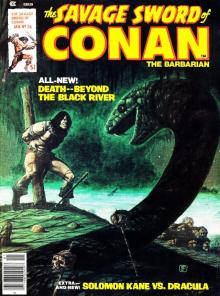 Beyond the Black River
Beyond the Black River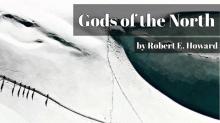 Gods of the North
Gods of the North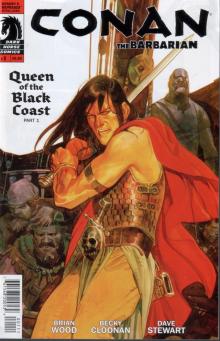 Queen of the Black Coast
Queen of the Black Coast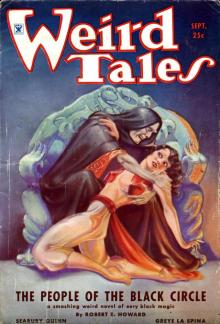 The People of the Black Circle
The People of the Black Circle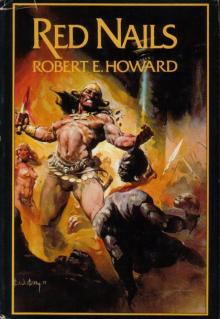 Red Nails
Red Nails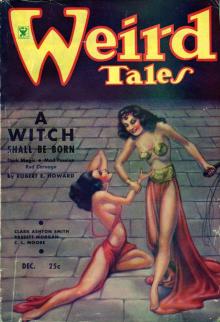 A Witch Shall Be Born
A Witch Shall Be Born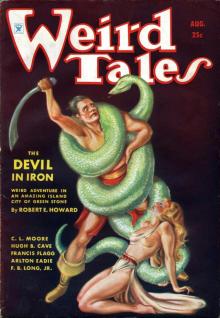 The Devil in Iron
The Devil in Iron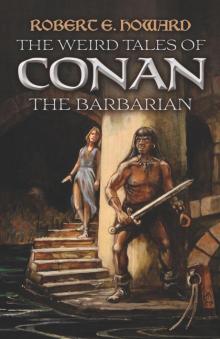 The Weird Tales of Conan the Barbarian
The Weird Tales of Conan the Barbarian The Bloody Crown of Conan
The Bloody Crown of Conan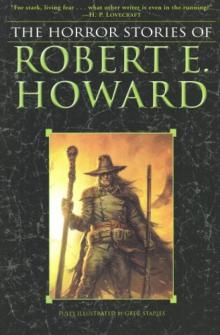 The Horror Stories of Robert E. Howard
The Horror Stories of Robert E. Howard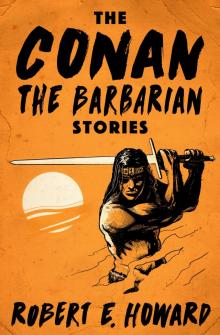 Conan the Conqueror
Conan the Conqueror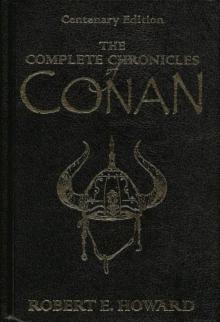 Conan the Barbarian
Conan the Barbarian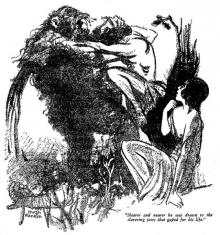 Shadows in the Moonlight
Shadows in the Moonlight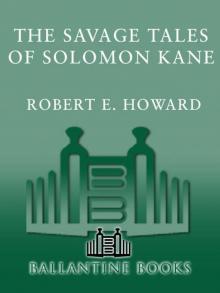 The Savage Tales of Solomon Kane
The Savage Tales of Solomon Kane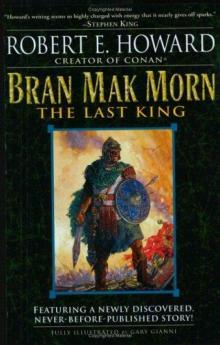 Bran Mak Morn: The Last King
Bran Mak Morn: The Last King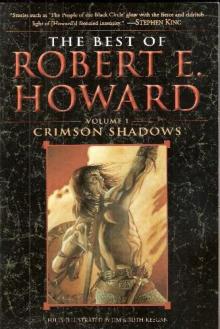 The Best of Robert E. Howard Volume One: Crimson Shadows
The Best of Robert E. Howard Volume One: Crimson Shadows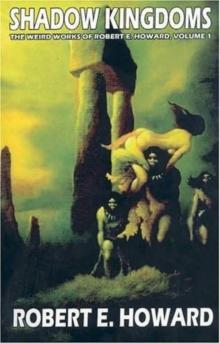 The Best of Robert E. Howard: Crimson Shadows (Volume 1)
The Best of Robert E. Howard: Crimson Shadows (Volume 1) Black Hounds of Death
Black Hounds of Death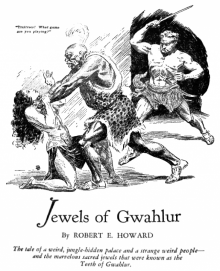 Jewels of Gwahlur
Jewels of Gwahlur Shadows in Zamboula
Shadows in Zamboula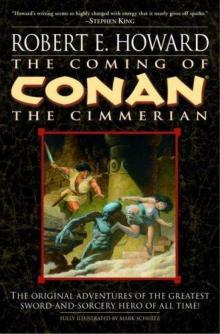 The Coming of Conan the Cimmerian
The Coming of Conan the Cimmerian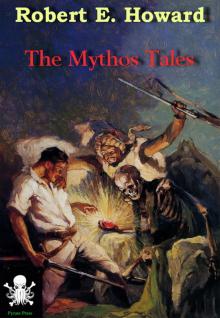 The Mythos Tales
The Mythos Tales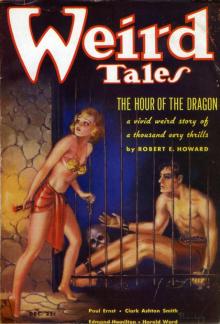 The Hour of the Dragon
The Hour of the Dragon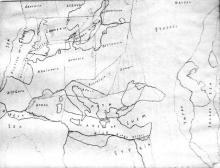 The Hyborian Age
The Hyborian Age El Borak and Other Desert Adventures
El Borak and Other Desert Adventures The Best of Robert E. Howard Volume 1 The Best of Robert E. Howard Volume 1
The Best of Robert E. Howard Volume 1 The Best of Robert E. Howard Volume 1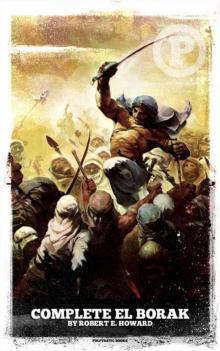 El Borak: The Complete Tales
El Borak: The Complete Tales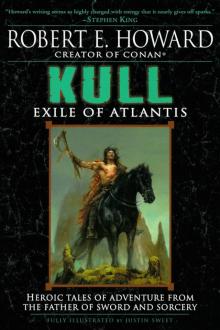 Kull: Exile of Atlantis
Kull: Exile of Atlantis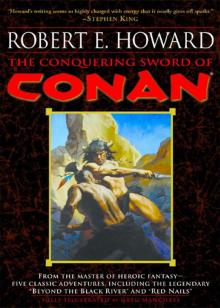 The Conquering Sword of Conan
The Conquering Sword of Conan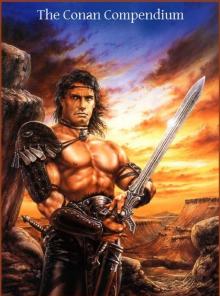 The Conan Compendium
The Conan Compendium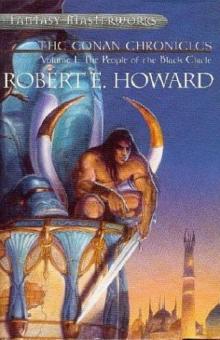 The Conan Chronicles: Volume 1: The People of the Black Circle
The Conan Chronicles: Volume 1: The People of the Black Circle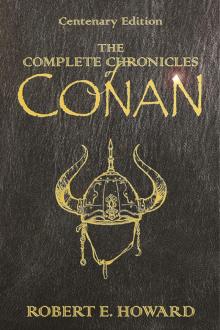 The Complete Chronicles of Conan: Centenary Edition
The Complete Chronicles of Conan: Centenary Edition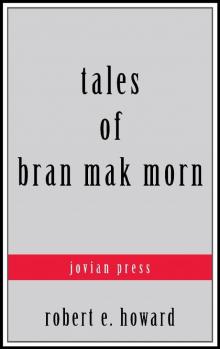 Tales of Bran Mak Morn (Serapis Classics)
Tales of Bran Mak Morn (Serapis Classics) Delphi Works of Robert E. Howard (Illustrated) (Series Four)
Delphi Works of Robert E. Howard (Illustrated) (Series Four)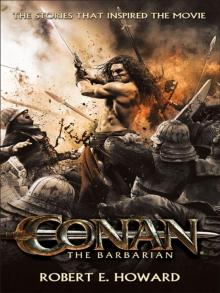 Conan the Barbarian: The Stories That Inspired the Movie
Conan the Barbarian: The Stories That Inspired the Movie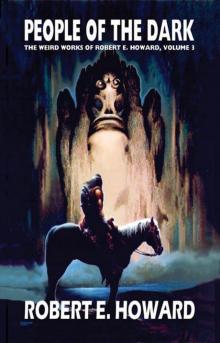 People of the Dark Robert Ervin Howard
People of the Dark Robert Ervin Howard Grim Lands
Grim Lands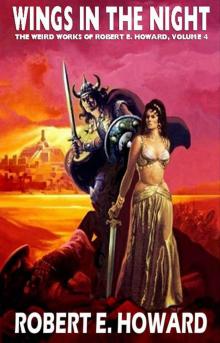 Wings in the Night
Wings in the Night Gardens of Fear
Gardens of Fear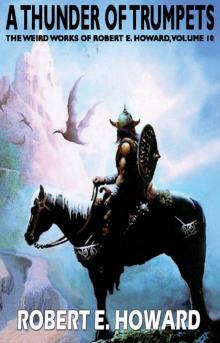 A Thunder of Trumpets
A Thunder of Trumpets Detective of the Occult
Detective of the Occult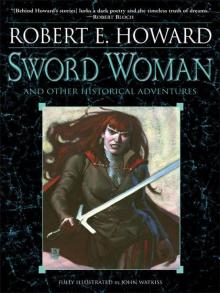 Sword Woman and Other Historical Adventures
Sword Woman and Other Historical Adventures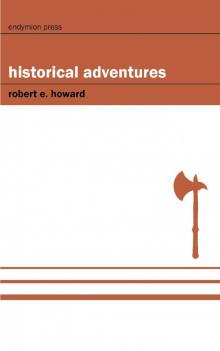 Historical Adventures
Historical Adventures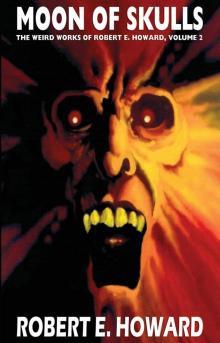 Moon of Skulls
Moon of Skulls The Robert E. Howard Omnibus: 97 Collected Stories
The Robert E. Howard Omnibus: 97 Collected Stories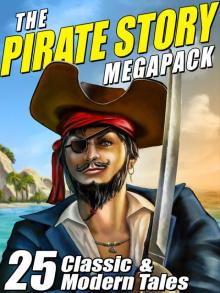 The Pirate Story Megapack: 25 Classic and Modern Tales
The Pirate Story Megapack: 25 Classic and Modern Tales The Best of Robert E. Howard, Volume 2
The Best of Robert E. Howard, Volume 2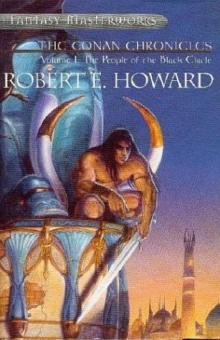 The Conan Chronicles, Vol. 1: The People of the Black Circle
The Conan Chronicles, Vol. 1: The People of the Black Circle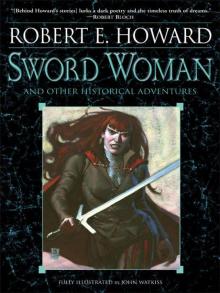 Sword Woman and Other Historical Adventures M
Sword Woman and Other Historical Adventures M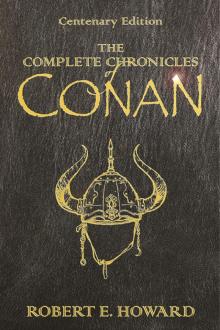 The Complete Chronicles of Conan
The Complete Chronicles of Conan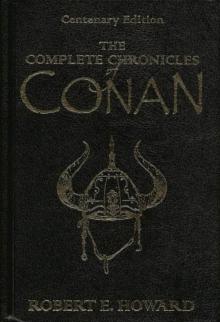 Conan the Barbarian: The Chronicles of Conan (collected short stories)
Conan the Barbarian: The Chronicles of Conan (collected short stories)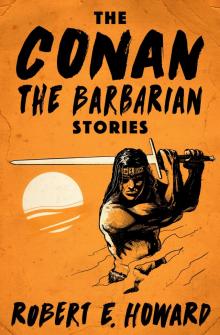 The Conan the Barbarian Stories
The Conan the Barbarian Stories The Best Horror Stories of
The Best Horror Stories of Tigers Of The Sea cma-4
Tigers Of The Sea cma-4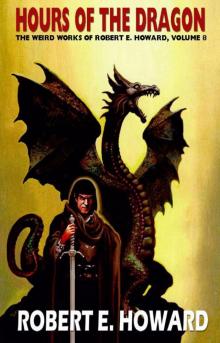 The Hours of the Dragon
The Hours of the Dragon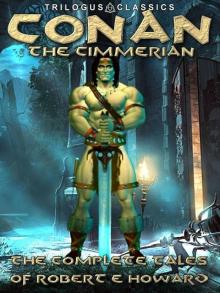 Conan the Cimmerian: The Complete Tales (Trilogus Classics)
Conan the Cimmerian: The Complete Tales (Trilogus Classics)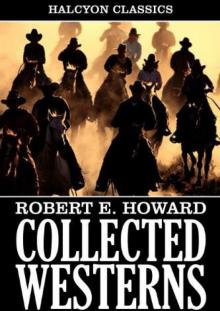 Collected Western Stories of Robert E. Howard (Unexpurgated Edition) (Halcyon Classics)
Collected Western Stories of Robert E. Howard (Unexpurgated Edition) (Halcyon Classics) The Best of Robert E. Howard, Volume 1
The Best of Robert E. Howard, Volume 1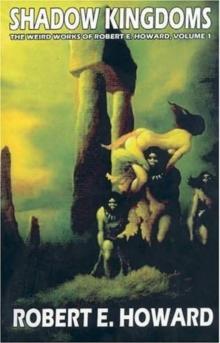 Shadow Kingdoms
Shadow Kingdoms